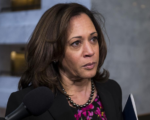Michigan Arab-Americans Voice Opposition to Kamala Harris’ Gaza Stance

In Dearborn, Michigan, a hub for Arab-Americans and home to the first Arab-majority city in the U.S., growing discontent is mounting toward Vice President Kamala Harris over her stance on the Gaza conflict. At the Sahara Restaurant, where Arabic news channels air footage of the ongoing war, many community members, like business owner Sam Hammoud, have voiced their frustration with the Biden administration’s Middle East policy. Hammoud, like many others, feels a personal connection to the conflict, with many calling for a ceasefire that has yet to come.
The Arab-American community, which played a key role in helping Joe Biden secure Michigan in 2020, has warned the Democratic Party not to take their support for granted. Many of these voters now find themselves uncommitted, torn between their long-standing loyalty to the Democratic Party and their dissatisfaction with Harris’ unwavering support for U.S. weapons policies and ties to Israel.
Prominent figures like Soujoud Hamade, president of the Michigan Chapter of the Arab American Bar Association, have openly switched allegiances, with Hamade now supporting Green Party candidate Jill Stein. A poll from the Council on American-Islamic Relations indicates a significant shift in Muslim voters, with 40% backing Stein, while Harris struggles with just 12% support in Michigan. This community, once a reliable Democratic bloc, is increasingly distancing itself due to Harris’ refusal to condemn policies contributing to violence in Gaza.
Adding to the frustration is Harris’ endorsement from former Vice President Dick Cheney, known for his role in the Iraq War, which left deep scars within the Arab-American community. For many like Dr. Maisa Hider-Beidoun, a lifelong Democrat and pharmacy owner, this endorsement is emblematic of how far the party has shifted. The community feels they are in a “moral dilemma” — balancing their identity as law-abiding, tax-paying Americans with the devastation affecting their families in the Middle East, exacerbated by U.S. foreign policy.
Despite Harris’ slight shift in tone, expressing more empathy than President Biden on the humanitarian crisis in Gaza, many Arab-American voters feel that these words are hollow without corresponding actions. The “Uncommitted Movement” within Michigan continues to challenge the Biden-Harris administration, warning that while they oppose Trump, they cannot back a candidate who has contributed to the conflict in Gaza.
Faye Nemer, CEO of the Middle East North American Arab Chamber of Commerce, reflects the community’s anguish. As someone who fled Lebanon due to political violence, she now struggles with the Gaza situation through the lens of her own experiences and the displacement of more than a million people. Many Arab-American voters like Nemer remain undecided or are considering third-party candidates.
Arab-Americans, numbering around 3.5 million in the U.S., represent a critical demographic in swing states like Michigan and Wisconsin. With the 2024 election on the horizon, this community is signaling to Democrats that their votes are no longer guaranteed, and the party must take meaningful steps to address their concerns about U.S. involvement in the Middle East if they hope to retain their support.





















